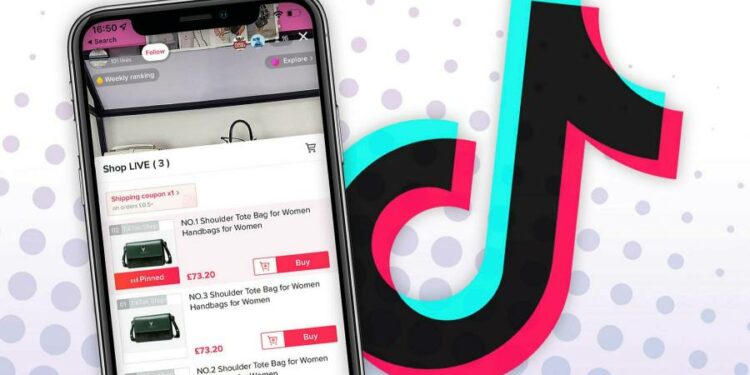TikTok influencers in the UK are dropping out of the company’s ecommerce programme, complaining of poor pay, long hours and promoting cheap products, in the latest signal that the company’s “livestream shopping” model is struggling to take off worldwide.
The Chinese owner of the social media platform, ByteDance, launched “TikTop Shop” in the UK last year, its first market outside Asia. The feature is an effort to bring QVC-style shopping to its billion users worldwide. Brands and influencers broadcast live on the social media app, selling products through a clickable orange basket on the screen.
Several so-called “content creators” with large online followings have told the Financial Times they have abandoned the project in recent weeks, complaining that their pay had been cut, while limited stock and shipping issues had resulted in abusive comments being directed at them.
“We are promised the world as creators and then told [we’re] not going to be getting that much,” said Carolina Are, who is among the influencers to stop selling through TikTok Shop. “[That is] emblematic of how little TikTok cares.”
The teething troubles represent another blow to TikTok’s hopes of replicating its social commerce strategy that has proved highly lucrative for Douyin, its Chinese sister app.
ByteDance raised $5bn in December 2020 at a $180bn valuation, and revenues increased 111 per cent last year to $34bn, according to people familiar with the matter. Its ecommerce expansion plans are considered a key part of justifying the lofty valuation.
Last week, a Financial Times investigation revealed that there had been an exodus of staff from TikTok’s London office, following complaints of an aggressive working culture that was enforced by the company’s leaders based in China.
After the revelations, Joshua Ma, a senior ByteDance executive who ran TikTok Shop in Europe, was replaced while the company investigates comments made to London-based workers that he “didn’t believe” that women should be entitled to maternity leave.
On TikTok Shop, products are sold directly from manufacturers and brands that are encouraged to offer heavy discounts.
The company’s ambition is a so-called dropship model where, instead of TikTok holding inventory, products are purchased from third-party suppliers as orders are placed and shipped directly to the customer, avoiding warehouse costs.
“TikTok has realised there isn’t much money in it for them, so they have cut costs which has led to a couple of people not wanting to continue,” said Elisha Kramer at Connect Management, an agency that represents TikTok creators. “It is time-consuming, can be exhausting and, when there are problems . . . creators bear the brunt of it.”
TikTok said it was “redefining shopping culture” and had seen a positive impact on small businesses which had increased revenues on the platform as well as larger brands that had reached new audiences.
“We are committed to learning, growing and improving as we build commerce solutions that bring value to merchants, creators and our community across the UK.”
Influencers on TikTok Shop are expected to broadcast live twice a week for between two to six hours per session. Initially, they were paid a base fee of thousands of pounds, as well as a commission on sales, but that fee was cut for most creators in April.
An account with several hundred thousand followers would receive around £5 for zero sales and up to £60 for more than 10 sales, based on pricing emails of a specific campaign seen by the FT.
A leadership board ranks creators and merchants based on the number of total sales they generate, rewarding a cash bonus for the top five sellers of between £1,000 to £5,000 for this campaign. TikTok gives a “free traffic boost” for the top 30 sellers, meaning their content reaches a larger audience, the email said.
TikTok often subsidises the costs of discounts at a loss to the company. The aggressive discounting has led to a conflict for brands that want to reach TikTok’s enormous base of young users, but do not want to undervalue their products.
“If it wasn’t under £20, it was too expensive, I had to keep asking brands to discount further,” said a current employee.
Creators, as well as current and former TikTok employees, also said they were unhappy with the “fast fashion” nature of many of TikTok Shop’s offerings.
“The clothes were bad quality and cheap, about £1 for a T-shirt and £7 for a coat,” said a former TikTok Shop presenter, who has changed careers as she was not earning enough. “They were selling so cheap, I don’t know what the margin could be.”
“You can’t be expected to discount everything,” a former employee said.
Counterfeit handbags and clothes were sold on livestreams, according to employees and videos seen by the FT. “Brands said they didn’t want to be on there because it was cheap and fake,” one former employee said. TikTok said it had strict guidelines and a team that monitored for counterfeit goods.
Influencers have also complained about the low quality and limited range of products, as they could not find items that matched their brand.
Are said she once posted a video selling socks which received 50,000 views but was paid nothing. “It is all spammy products that have nothing to do with my audience,” she said. “I would feel like I’d be selling myself if I was selling them,” she said.
ByteDance executives consider TikTok Shop the future of shopping, but transporting the successful model from Asia has proved difficult, with London employees complaining that the company’s leadership do not understand the British market or listen to feedback from experienced staff or brands.
A current employee said: “There has been an arrogance and ignorance of trying to export the model from Douyin but not wanting to localise the experience.”











